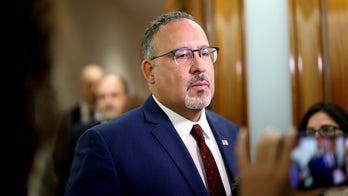John McCain and Barack Obama have spent the past few weeks fighting over the state of the economy and whether pigs wear lipstick, but they also have real policy differences when it comes to health, science and technology. The following is a brief overview of each candidate's position on a number of the most pressing issues.
Broadband Adoption
The U.S. lags behind Canada, South Korea and most of northern Europe in per-capita broadband "penetration," or how much of its population has a high-speed Internet connection. Many Democrats have called for better and faster Internet access to make up for this gap.
McCain and Obama both say they believe broadband access must be universal in the U.S., and both support opening up the wireless spectrum and have proposed public/private partnerships to help broadband access reach underserved and rural areas.
The Federal Communications Commission currently defines "broadband" as 200 kbps, which Obama says is "astonishingly low." He proposes defining that upward so that slower connections can't label themselves as broadband. Obama also says that broadband must reach all schools, libraries and hospitals.
McCain supports allowing local governments to build broadband infrastructure when private companies fail to do so.
Cancer Research
Both McCain and Obama have pledged to increase cancer funding for research and improve patient access to screening and clinical trials. (The National Cancer Institute's total budget has been reduced under the Bush administration from $4.83 billion in 2005 to $4.75 billion in 2007.)
McCain, who has had four malignant melanomas -- the deadliest type of skin cancer -- removed since 1993, has said he will reverse the trend of cutting cancer funding and will double funding to the National Institutes of Health for cancer research. He will also work to better coordinate efforts between the NIH, the National Cancer Institute, and the private sector, so that research can be translated quickly and more efficiently to patients' bedsides.
Obama, whose mother died from ovarian cancer, also supports doubling cancer research funding and has called the cuts to the National Cancer Institute counterproductive, saying they hurt the country's tradition of "medical innovation." As president, he says he will make ending cancer a "top priority" and increase funding to both the NCI and the NIH.
Climate Change
President Bush has called for halting the growth of U.S. greenhouse gas emissions by 2025, a stance that environmental groups consider insufficient.
Both Obama and McCain agree that greenhouse gas emissions threaten the environment. Both have announced plans to reduce those emissions to 1990 levels by the year 2020, and both support the idea of setting limits while providing economic incentives to industrial polluters, called cap-and-trade, in order to ease the transition for companies as they lower their emissions.
Obama supports re-engaging the U.N. Framework Convention on Climate Change and proposes creating a Global Energy Forum, composed of the world's largest energy-consuming nations. Obama generally follows the Democratic Party line on climate change. He plans to reduce emissions to 80 percent below 1990 levels by 2050.
In contrast, McCain has called for lowering emissions to only 60 percent below those levels by 2050. One of the first senators to raise the call to combat global warming, McCain supports CAFE standards, the fleet-mileage requirements that carmakers must meet or otherwise face penalties. He proposes increasing those penalties so that car companies can not dodge them. McCain is out of step with the Republican Party on climate change.
Evolution and Creationism
In 1987, the U.S. Supreme Court ruled in case of Edwards v. Aguillard that to require the teaching of "creation science" alongside evolution violated the First Amendment by promoting religion.
Creationism is the belief that God created the universe and everything in it, as described in Genesis. A variant of creationism, intelligent design, essentially accepts evolution but argues that Charles Darwin's theory of natural selection cannot fully explain the origin of life or the emergence of highly complex life forms. It looks to an unnamed intelligent force as the creator and guider of life.
Almost all scientists oppose teaching creationism and intelligent design because they have no scientific basis. Both McCain and Obama believe in evolution, and neither candidate wishes to see intelligent design taught as a science.
Obama does not support teaching intelligent design in schools at all. "Intelligent design is not science," he said at a town hall event in Illinois. "I think it's a mistake to try to cloud the teaching of science with theories that frankly don't hold up to scientific inquiry," he told the York Daily Record.
McCain has not clearly stated his position on the teaching of intelligent design in school. "I happen to believe in evolution," he has said. "I respect those who think the world was created in seven days. Should it be taught as a science class? Probably not."
But McCain has not ruled out teaching it in other classes, and he has said that "there's nothing wrong with teaching different schools of thought." He says that local school boards, not the federal government, should determine school curricula.
'Green' Technology
McCain and Obama both demand a reduced reliance on foreign oil and support "clean coal technology," which will reduce carbon emissions from burned coal. Both support "smart" electric grids to reduce energy use at home, and both support developing alternative energy sources such as solar and wind power.
McCain hopes to build 45 new nuclear reactors by 2030, plans to offer a $5,000 tax credit for purchasing zero-carbon-emissions cars and has suggested a $300 million prize for building a better plug-in battery for hybrid and fully electric cars.
Obama plans to weatherize 1 million homes annually to reduce energy use; offer a $7,000 tax credit for purchasing no-carbon-emissions vehicles; and press for the use of more biofuels.
HIV/AIDS
President Bush created the $15 billion President's Emergency Program for AIDS Relief (PEPFAR), which helps treat and prevent HIV/AIDS in sub-Saharan Africa and the Caribbean. The program was reauthorized this year, bumping U.S. contributions up to $48 billion over the next five years.
Obama has pledged to increase funding for PEPFAR to $50 billion and plans to revise the bill to include Southeast Asia, India and Eastern Europe. He hopes to enhance investments in anti-retroviral treatment and increase U.S. relief contributions. He also plans to establish a unit at the NIH solely dedicated to the development of microbicides, a class of products that women could use to protect themselves from contracting HIV and, experts say, could potentially halt 2.5 million new infections over a period of three years.
McCain has been a vocal supporter of PEPFAR, but has yet to detail a specific policy. He says current PEPFAR funding would be a launching point for him. McCain says corrupt governments are the biggest obstacle in building a solid health-care infrastructure in Africa.
Net Neutrality
Internet service providers (ISPs) want more money to build fiber-optic networks and increase their bandwidth as they become overloaded by video-streaming Web sites such as YouTube and by heavy downloaders of music, movies and TV shows.
Some ISPs propose asking YouTube and other data-intensive Web-based companies for fees that would ensure their content got to consumers quickly; companies who didn't pay up would have their data transmitted at slower speeds.
Opponents say this would place "tolls" on the information superhighway, and suggest federal regulation to maintain the existing status quo, a state of "net neutrality" where every bit and byte is treated equally as they move along the Internet.
Obama "strongly supports the principle of network neutrality" and opposes a "two-tier Internet in which Web sites with the best relationships with network providers can get the fastest access to consumers, while all competing Web sites remain in a slower lane."
McCain "does not believe in prescriptive regulation like 'net-neutrality,'" and says the government should regulate the Internet only sparingly. "Government should have to prove regulation is needed," he argues, "rather than have entrepreneurs prove it is not."
Space Exploration
The Bush administration has long favored manned missions, which are risky, expensive and often scientifically unnecessary, over cheaper and safer robotic missions.
The current space shuttle program is set to expire in 2010, leaving a five-year gap until the next phase of manned space vehicles, the Constellation/Ares program, is ready for launch in 2015.
McCain supports manned spaceflight, which he says goes "well beyond the issue of scientific discovery and is a reflection of national power and pride." He supports funding for NASA's Constellation program to inaugurate a "new era of human exploration." He would also keep the space shuttle program in operation until the new vehicles are completed in 2015.
Obama wants NASA to pursue "both human and robotic space exploration." He stresses international cooperation and pledges to reestablish the National Aeronautics Space Council, which advised presidents for decades, to "oversee and coordinate civilian, military, commercial and national security space activities."
Stem-Cell Research
Proponents of embryonic stem cell research believe it holds the key to finding cures for diseases such as Alzheimer's, Parkinson's and diabetes. President Bush has opposed federal funding for stem cells extracted from embryos that were created for the purpose of research.
The debate could soon be irrelevant, as recent advances in amniotic fluid, umbilical cord blood and adult stem cell research could aid in curing diseases without necessitating the destruction of embryos for use in research.
McCain takes a position similar to the president's. While he opposes the intentional creation of human embryos for research purposes, he supports funding for stem cells retrieved from already destroyed embryos. Previously, McCain voted to ban the practice of "fetal farming," making it a federal crime for researchers to use cells or fetal tissue from an embryo created for research purposes. McCain also supports funding for other stem cell research programs, including amniotic fluid and adult stem cell.
Obama supports expanding research on embryonic stem cells and would lift the restrictions Bush put in place. Obama believes embryos housed in fertility clinics that will not be used for reproductive purposes should be used for the purpose of stem cell research. He introduced legislation in the Illinois Senate to allow embryonic stem cell research in the state. Despite advances in the use of adult and cord blood stem cells, Obama believes embryonic stem cells hold a greater potential for fighting diseases.
Superbugs and Pandemics
Some scientists fear that "superbugs" -- antibiotic-resistant strains of bacteria -- could bring about deadly worldwide pandemics. As many as 18,000 Americans die from MRSA (methicillin resistant staphylococcus aureus) infections each year, while drug-resistant tuberculosis is rampant in prisons.
The government is also preparing for the spread of viral diseases like the H5N1 avian flu, which some estimates suggest could kill up to 300 million people worldwide if it "jumps" to humans before a vaccine can be developed.
Under the Bush administration's 2009 budget, the infectious disease program at the Centers for Disease Control and Prevention would lose more than $34 million in funding, further restricting the CDC's severely strapped antimicrobial resistance budget.
Both candidates have announced plans to combat the spread of disease, and both candidates say they strongly support full funding for the CDC.
McCain has outlined a plan to face global pandemics in four stages: stopping the spread of disease to the U.S.; limiting the spread of disease within the U.S.; minimizing painful symptoms and warding off death with effective treatments and countermeasures; and maintaining a functioning economy and community.
Obama has pledged to dedicate $10 billion annually to electronic health information systems in general, which he says will help track the spread and origins of disease. "I will invest in new vaccines and technology to detect attacks and to trace them to their origin, so that we can react in a timely fashion," he said.




